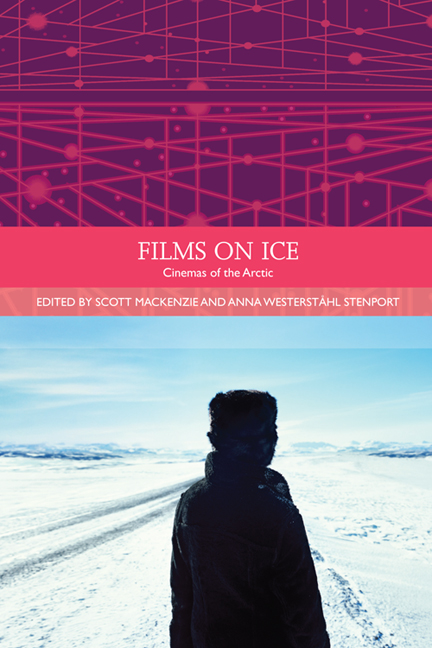Book contents
- Frontmatter
- Contents
- List of Illustrations
- Acknowledgements
- Traditions in World Cinema
- Introduction: What are Arctic Cinemas?
- PART I GLOBAL INDIGENEITY
- 1 ‘Who Were We? And What Happened to Us?’: Inuit Memory and Arctic Futures in Igloolik Isuma Film and Video
- 2 Northern Exposures and Marginal Critiques: The Politics of Sovereignty in Sámi Cinema
- 3 Frozen in Film: Alaska Eskimos in the Movies
- 4 Cultural Stereotypes and Negotiations in Sámi Cinema
- 5 Cinema of Emancipation and Zacharias Kunuk's Atanarjuat: The Fast Runner
- 6 Cosmopolitan Inuit: New Perspectives on Greenlandic Film
- 7 Arctic Carnivalesque: Ethnicity, Gender and Transnationality in the Films of Tommy Wirkola
- PART II HOLLYWOOD HEGEMONY
- PART III ETHNOGRAPHY AND THE DOCUMENTARY DILEMMA
- PART IV MYTHS AND MODES OF EXPLORATION
- Notes on the Contributors
- Index
6 - Cosmopolitan Inuit: New Perspectives on Greenlandic Film
from PART I - GLOBAL INDIGENEITY
Published online by Cambridge University Press: 05 September 2016
- Frontmatter
- Contents
- List of Illustrations
- Acknowledgements
- Traditions in World Cinema
- Introduction: What are Arctic Cinemas?
- PART I GLOBAL INDIGENEITY
- 1 ‘Who Were We? And What Happened to Us?’: Inuit Memory and Arctic Futures in Igloolik Isuma Film and Video
- 2 Northern Exposures and Marginal Critiques: The Politics of Sovereignty in Sámi Cinema
- 3 Frozen in Film: Alaska Eskimos in the Movies
- 4 Cultural Stereotypes and Negotiations in Sámi Cinema
- 5 Cinema of Emancipation and Zacharias Kunuk's Atanarjuat: The Fast Runner
- 6 Cosmopolitan Inuit: New Perspectives on Greenlandic Film
- 7 Arctic Carnivalesque: Ethnicity, Gender and Transnationality in the Films of Tommy Wirkola
- PART II HOLLYWOOD HEGEMONY
- PART III ETHNOGRAPHY AND THE DOCUMENTARY DILEMMA
- PART IV MYTHS AND MODES OF EXPLORATION
- Notes on the Contributors
- Index
Summary
Greenland National Museum, April 2006. Frank Sinatra's classic ‘New York New York’ is flowing out of the speakers: ‘I want to wake up in a city that never sleeps … These little town blues are melting away … I want to be a part of it … I'll make a brand new start of it …’ The song is the soundtrack to the video installation Nuuk York Nuuk York, produced by the organisation Inuit Youth International in connection with the project Rethinking Nordic Colonialism. With the help of visual collages, trick photography and carefully chosen localities, Nuuk is resurrected in the video as Nuuk York. The old colonial harbour with its vilified 1970s apartment buildings is transformed: behind the apartment buildings towers a city of skyscrapers that looks unmistakably like Manhattan. Through this new, pulsating city rush busy urban people, who in clothing and aura are reminiscent of Japanese businessmen, goal-oriented and serious, dressed in expensive three-piece suits, with smart glasses, watches and cell phones. The video concludes with a meeting in the sky-top penthouse of an international hotel, somewhat reminiscent of Nuuk's Hotel Hans Egede, but where the usual view of the fjord is exchanged for skyscrapers, maintaining the Nuuk York vision. This is the entire plot of the film, but nonetheless Nuuk York was the highpoint of the exhibition and what everyone was talking about. By making the lyrics of ‘New York New York’ their own, the young people expressed their vision of the Nuuk of the future. Yet a digitally connected modern life is a reality that young people are already living: a life markedly differentiated from the customary pictures of Greenland as an almost untouched natural state. Eighty-four per cent of the population of Greenland live in cities today, one quarter of them in the capital city Nuuk, and only a few have personal experience of hunting, trapping or fishing.
By playing on their physical resemblance to the Japanese, the young people assumed the identity that the 1970s generation renounced with the category ‘indigenous people’ and its attendant romantic conceptions of a ‘truer’ humanity (cf. Inuit = people), unspoilt by alienating Western civilisation.
- Type
- Chapter
- Information
- Films on IceCinemas of the Arctic, pp. 97 - 104Publisher: Edinburgh University PressPrint publication year: 2014



